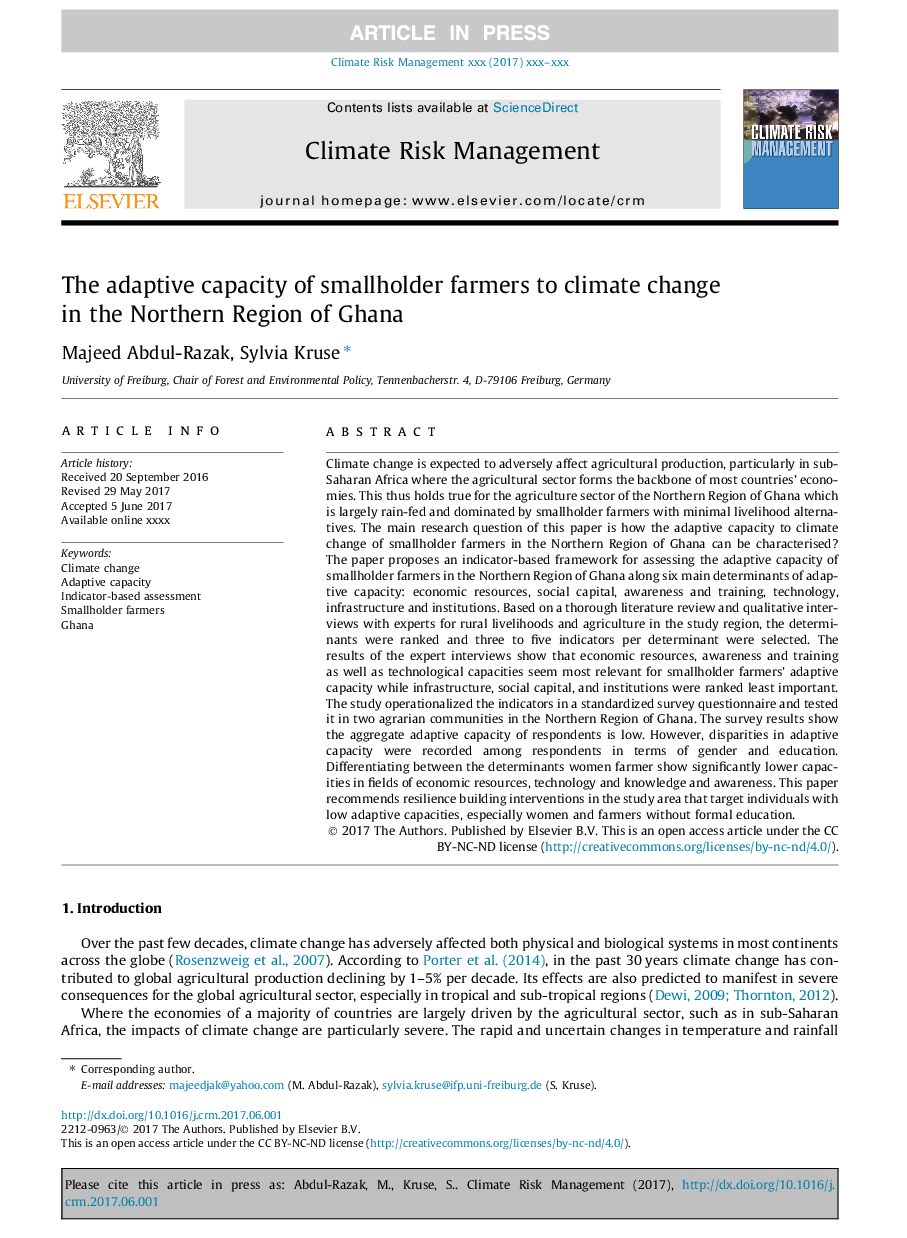| کد مقاله | کد نشریه | سال انتشار | مقاله انگلیسی | نسخه تمام متن |
|---|---|---|---|---|
| 5115285 | 1484875 | 2017 | 19 صفحه PDF | دانلود رایگان |
عنوان انگلیسی مقاله ISI
The adaptive capacity of smallholder farmers to climate change in the Northern Region of Ghana
ترجمه فارسی عنوان
ظرفیت سازگاری کشاورزان خرده مالکان به تغییرات آب و هوایی در منطقه شمالی غنا
دانلود مقاله + سفارش ترجمه
دانلود مقاله ISI انگلیسی
رایگان برای ایرانیان
کلمات کلیدی
تغییر آب و هوا، ظرفیت سازگاری، ارزیابی مبتنی بر شاخص، کشاورزان کوچک، غنا،
ترجمه چکیده
انتظار می رود که تغییرات آب و هوایی بر تولید محصولات کشاورزی تاثیر بگذارد، به ویژه در مناطق جنوب صحرای آفریقا که بخش کشاورزی بخش عمده ای از اقتصادهای کشورهای را تشکیل می دهند. بنابراین این امر در مورد بخش کشاورزی منطقه شمالی غنا درست است که عمدتا بارانی است و تحت تأثیر کشاورزان خرده مالکان با معایب معیشتی معیشت است. سوال اصلی پژوهش حاضر این است که چگونه ظرفیت سازگاری با تغییرات آب و هوایی دامداران صغیر در منطقه شمالی غنا مشخص می شود؟ این مقاله چارچوب مبتنی بر شاخص را برای ارزیابی ظرفیت سازگاری کشاورزان کوچک در منطقه شمالی غنا در شش عامل اصلی ظرفیت سازگاری: منابع اقتصادی، سرمایه اجتماعی، آگاهی و آموزش، فناوری، زیرساخت ها و نهادها ارائه می دهد. بر اساس مرور ادبیات کامل و مصاحبه های کیفی با کارشناسان برای معیشت و کشاورزی روستایی در منطقه مطالعه، عوامل تعیین کننده و سه تا پنج شاخص برای هر عامل تعیین شد. نتایج مصاحبه های کارشناسانه نشان می دهد که منابع اقتصادی، آگاهی و آموزش، و همچنین ظرفیت های تکنولوژیکی، بیشتر مربوط به ظرفیت سازگاری کشاورزان خرده مالکان هستند در حالیکه زیرساخت ها، سرمایه اجتماعی و موسسات حداقل اهمیت دارند. این تحقیق شاخص های خود را در یک پرسشنامه نظرسنجی استاندارد شده و در دو منطقه کشاورزی در منطقه شمال غنا مورد آزمایش قرار داد. نتایج نظرسنجی نشان می دهد ظرفیت انطباق کلی پاسخ دهندگان کم است. با این حال، تفاوت در ظرفیت انطباق در میان پاسخ دهندگان از لحاظ جنسیت و تحصیل ثبت شد. تمایز میان عوامل تعیین کننده زن کشاورزان به طور قابل توجهی کمتری در زمینه منابع اقتصادی، فن آوری و دانش و آگاهی نشان می دهد. این مقاله توصیه می کند که مداخلات ساختمان مقاومتی در منطقه مورد مطالعه، هدف افراد با ظرفیت سازگاری کم، به خصوص زنان و کشاورزان بدون آموزش رسمی است.
موضوعات مرتبط
مهندسی و علوم پایه
علوم زمین و سیارات
علم هواشناسی
چکیده انگلیسی
Climate change is expected to adversely affect agricultural production, particularly in sub-Saharan Africa where the agricultural sector forms the backbone of most countries' economies. This thus holds true for the agriculture sector of the Northern Region of Ghana which is largely rain-fed and dominated by smallholder farmers with minimal livelihood alternatives. The main research question of this paper is how the adaptive capacity to climate change of smallholder farmers in the Northern Region of Ghana can be characterised? The paper proposes an indicator-based framework for assessing the adaptive capacity of smallholder farmers in the Northern Region of Ghana along six main determinants of adaptive capacity: economic resources, social capital, awareness and training, technology, infrastructure and institutions. Based on a thorough literature review and qualitative interviews with experts for rural livelihoods and agriculture in the study region, the determinants were ranked and three to five indicators per determinant were selected. The results of the expert interviews show that economic resources, awareness and training as well as technological capacities seem most relevant for smallholder farmers' adaptive capacity while infrastructure, social capital, and institutions were ranked least important. The study operationalized the indicators in a standardized survey questionnaire and tested it in two agrarian communities in the Northern Region of Ghana. The survey results show the aggregate adaptive capacity of respondents is low. However, disparities in adaptive capacity were recorded among respondents in terms of gender and education. Differentiating between the determinants women farmer show significantly lower capacities in fields of economic resources, technology and knowledge and awareness. This paper recommends resilience building interventions in the study area that target individuals with low adaptive capacities, especially women and farmers without formal education.
ناشر
Database: Elsevier - ScienceDirect (ساینس دایرکت)
Journal: Climate Risk Management - Volume 17, 2017, Pages 104-122
Journal: Climate Risk Management - Volume 17, 2017, Pages 104-122
نویسندگان
Majeed Abdul-Razak, Sylvia Kruse,
